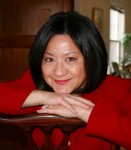Art of Column Writing
By Suzette Martinez Standring
2004-06 President
National Society of Newspaper Columnists

Suzette Standring
The French magazine Charlie Hebdo was notorious for its offensive satire on religion, and gunmen proclaiming revenge in the name of the Prophet Mohammed imposed the ultimate form of censorship. Death. Those who peddle in professional mockery now fear for their lives. If we let them.
Satirists. I never saw that one coming.
Satire is defined as “a way of using humor to show that someone or something is foolish, weak, bad, etc. Humor that shows the weaknesses or bad qualities of a person, government, society, etc.” (Merriam Webster Dictionary.)
Charlie Hebdo hit a nerve. After the massacre, the magazine roared back with a follow-up edition of millions of copies, sold out to free-speech supporters. Boy, did that backfire. Perhaps al Qaeda now has an inkling that freedom of expression is a forever fundamental.
Silence? Never! But what about the gentle shushing we as writers might self-impose during highly charged times? After all, common wisdom advises against talk of politics and religion. Do we apply a dinner party yardstick of “getting along” to our columns for fear of alienating our readers?
In the case of Charlie Hebdo, Muslims who know there is nothing honorable in those killings need to keep raising their voices. Just like we do.
Now the BBC is asking its writers to no longer use the word “terrorist.” Too loaded, too much value judgment, according to Tarik Kafala, the head of BBC Arabic, the largest of the BBC’s non-English language news services. Instead, for example, “Two gunmen killed 12 people” is sufficient and non-inflammatory.
Pabulum prose is not the answer.
Readers search for meaning and motives. Grasping the dynamics of people, places and situations lead to awareness and hopefully, to change. Would the tragedy in Ferguson be as highly scrutinized if the news read, “Police officer shoots suspect” versus “White cop shoots unarmed black man”? That sentence is loaded with back story, and because it is, national examination takes place.
The answer is not to control words or ways of expression. The key is to be part of a national, intelligent dialogue.
There has been much ado about Charlie Hebdo’s right to offend. In a civilized society, one isn’t shot for disrespect. Of course, in a civilized society, respect and a good breakfast would start everybody’s morning and carry the day.
But we’re human. We disagree and fight and throw F-bombs. World peace? Read blog post comments, and assume the impossibility. Yet from the cacophony, insightful discourse rises to the top, and we columnists have to be part of it.
As a spirituality columnist, ridicule is not my personal stock-in-trade. I don’t make fun of other people’s religions. However, I have criticized the way people practice their beliefs, especially when they fall so far afield in a major tenet as “Thou shalt not murder.”
As a professional columnist, I will use whatever words I deem to be accurate as well as humor, analysis, or personal stories to move things in a better direction.
The stakes are higher because journalists, columnists, satirists and frickin’ cartoonists are at risk because someone with a gun, an agenda and a hair-trigger personality threatens their lives. If we let them. Free speech is part of the American fabric. Wrap yourself in it and get stronger with exercise.
• • •
Email Suzette Standring: suzmar@comcast.net. She is the author of The Art of Column Writing, and her new book is The Art of Opinion Writing. Visit www.readsuzette.com.


1 comment for “Silence? Never. But Do We Shush Ourselves?”